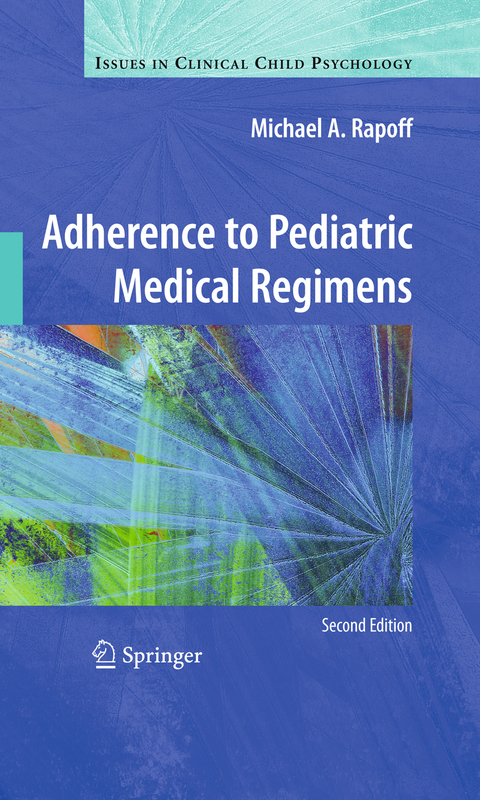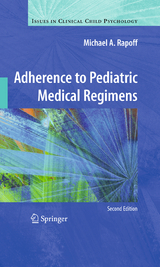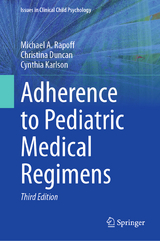Adherence to Pediatric Medical Regimens
Springer-Verlag New York Inc.
978-1-4419-0569-7 (ISBN)
- Titel erscheint in neuer Auflage
- Artikel merken
It used to be called noncompliance, and the patients themselves referred to as difficult. But regardless of the terminology, children’s reluctance or failure to commit to prescribed regimens reduces the effectiveness of treatment, often leading to additional care, higher costs, and serious, even deadly, complications.
Reflecting a single, authoritative voice, the Second Edition of Adherence to Pediatric Medical Regimens analyzes in comprehensive clinical detail the factors that affect children’s and teens’ commitment to treatment – from developmental issues to the influence of parents, peers, and others in their orbit – and offers empirically sound guidelines for encouraging adherence. It cautions against viewing young clients as miniature grownups or scaling down adult data, advocating instead for a more nuanced understanding of the population and a collaborative relationship between practitioner and client.
Critical areas of interest to clinicians and researchers in pediatrics are brought into clear focus as the book:
Provides an overview of adherence rates to chronic and acute disease regimens and examines common adherence problems in children and adolescents.
Details consequences of nonadherence and correlates of adherence.
Critiques major adherence theories and their clinical implications.
Discusses the range of adherence assessment measures.
Reviews educational, behavioral and other strategies for improving adherence.
Offers ways to translate research into pediatric medical adherence.
This updated edition of Adherence to Pediatric Medical Regimens is an essential reference for anyone concerned with improving health outcomes in young people, especially clinicians, researchers, and graduate students in psychiatry as well as pediatric, clinical child, and health psychology.
Michael Rapoff received his PhD in Developmental and Child Psychology in 1980 from the University of Kansas and completed a two year post-doctoral internship in Behavioral Pediatrics at the University of Kansas Medical Center. Dr. Rapoff is currently Ralph L. Smith Professor of Pediatrics and Chief of the Behavioral Pediatrics division in the Department of Pediatrics at the University of Kansas Medical Center. Dr. Rapoff is a Fellow of the American Psychological Association, is a licensed psychologist in Kansas and Missouri, and is listed in the National Registry of Health Service Providers in Psychology. His research interests during the past 26 years has focused on psychosocial issues affecting children and adolescents with chronic diseases, including adherence to medical regimens, pain, and psychosocial adjustment. He has been funded by NIH and Maternal and Child Health to evaluate strategies for improving adherence to medical regimens for children with asthma and juvenile rheumatoid arthritis (JRA) and by the Arthritis Foundation for evaluating a cognitive-behavioral pain management program for children and adolescents with JRA. Dr. Rapoff has 73 publications in journals or books, including a single-authored book published in 1999 on pediatric medical adherence (Adherence to Pediatric Medical Regimens, Kluwer/Plenum). In 2003, Dr. Rapoff received the Distinguished Scholar Award from the Association of Rheumatology Health Professionals, a division of the American College of Rheumatology, in recognition of outstanding rheumatology scholarship. Also in 2003, Dr. Rapoff was elected as a Fellow in the Society of Pediatric Psychology, Division 54 of the American Psychological Association. Dr. Rapoff is currently funded by NIH to evaluate the efficacy of a computer-based CD-ROM program (Headstrong) for treating chronic headaches in children. In addition to his research, Dr. Rapoff trains clinical psychology students in health psychology and pediatric psychology and teaches residents and medical students. He also sees patients once per week in his Behavioral Pediatrics Outreach Clinic in Lawrence, KS.
Definitions, Types, and Prevalence of Nonadherence.- Consequences, and Correlates.- Adherence Theories: Review, Critique, and Clinical Implications.- Assessing Adherence.- Assessing Disease and Health Status.- Strategies for Improving Adherence to Pediatric Medical Regimens.- Review of Adherence Intervention Studies and Recommendation for Research in Clinical Practice.- References.- Appendix.- Index.
| Reihe/Serie | Issues in Clinical Child Psychology |
|---|---|
| Zusatzinfo | 11 Tables, black and white; XII, 232 p. |
| Verlagsort | New York, NY |
| Sprache | englisch |
| Maße | 155 x 235 mm |
| Gewicht | 1150 g |
| Themenwelt | Geisteswissenschaften ► Psychologie ► Entwicklungspsychologie |
| Geisteswissenschaften ► Psychologie ► Pädagogische Psychologie | |
| Medizin / Pharmazie ► Medizinische Fachgebiete ► Medizinethik | |
| Medizin / Pharmazie ► Medizinische Fachgebiete ► Pädiatrie | |
| Medizin / Pharmazie ► Medizinische Fachgebiete ► Psychiatrie / Psychotherapie | |
| ISBN-10 | 1-4419-0569-3 / 1441905693 |
| ISBN-13 | 978-1-4419-0569-7 / 9781441905697 |
| Zustand | Neuware |
| Informationen gemäß Produktsicherheitsverordnung (GPSR) | |
| Haben Sie eine Frage zum Produkt? |
aus dem Bereich





